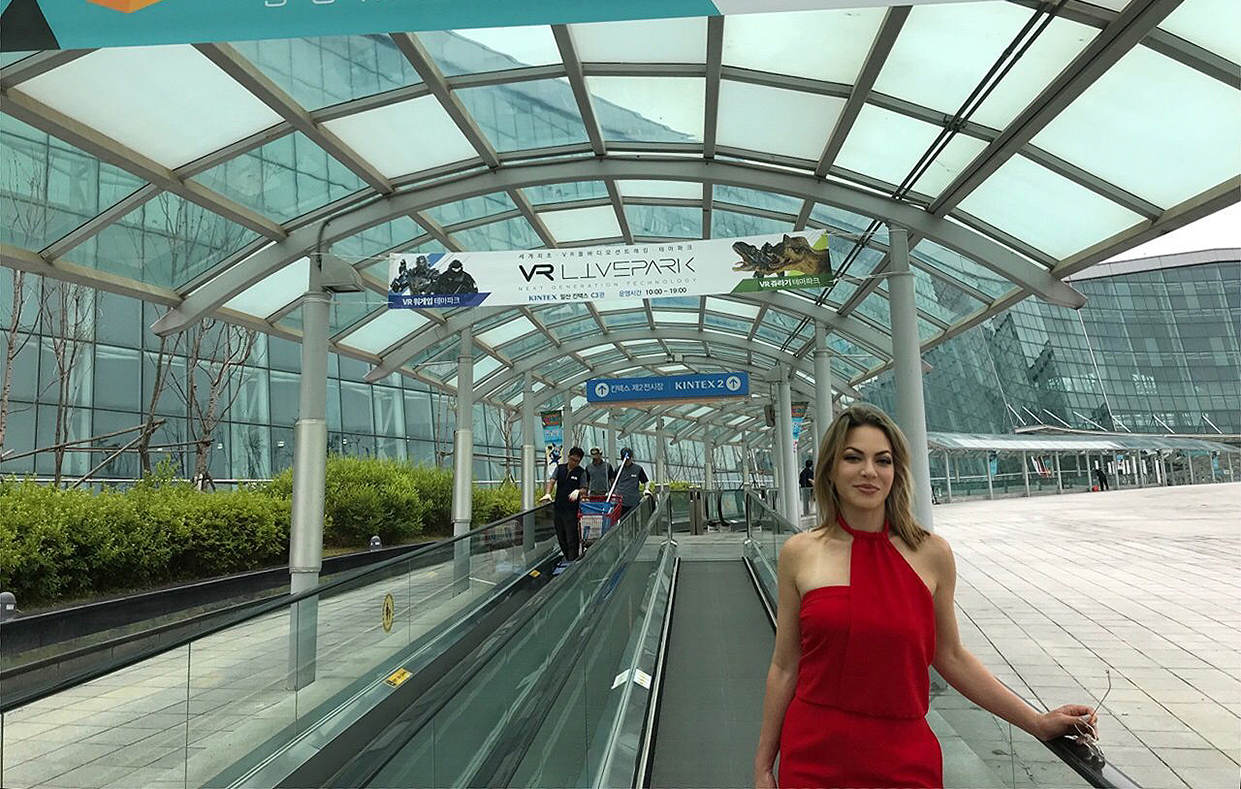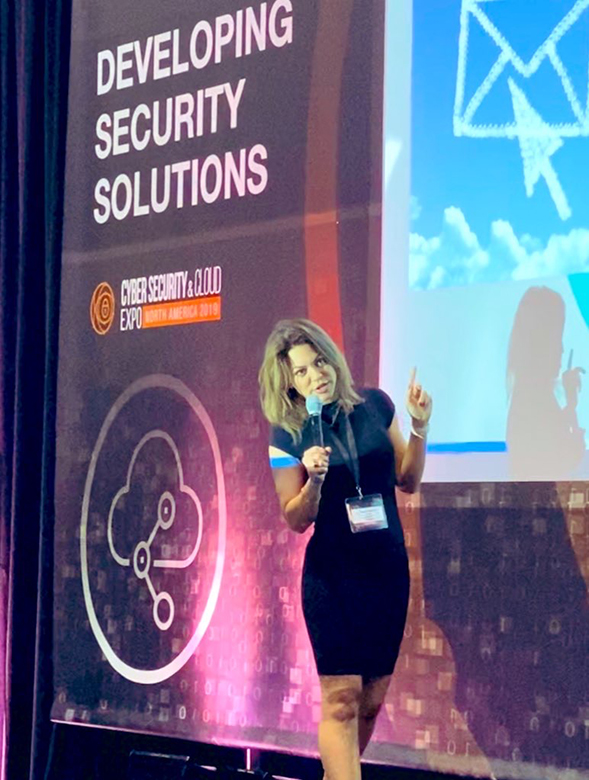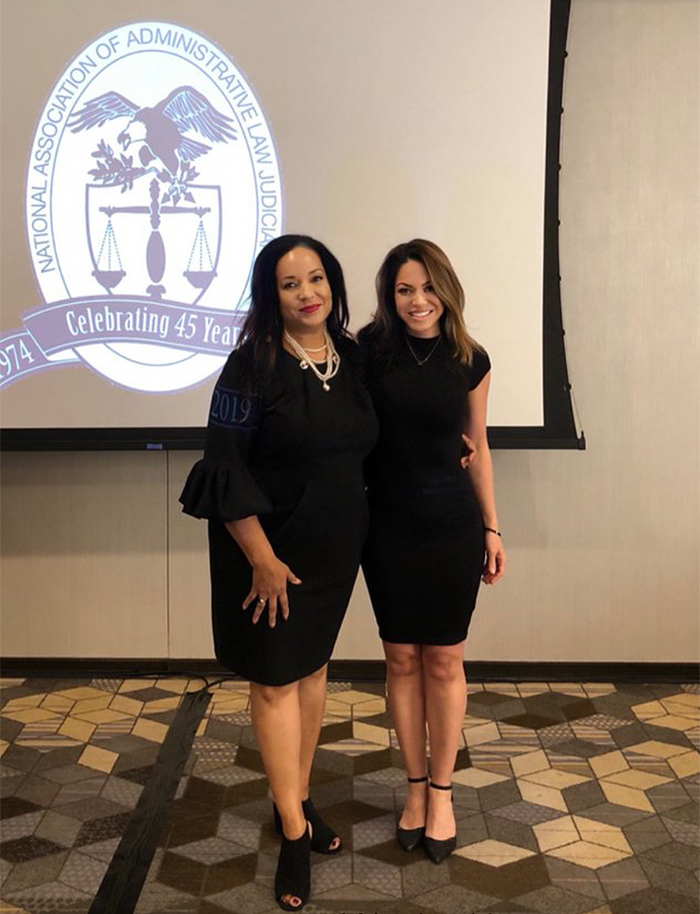Interview by Visual Collaborative
October 2020 15 min read

Based in San Francisco, Naomi Assaraf has been a leader in business for more than two decades. She is the co-founder and CMO of cloudHQ, a successful email management company that makes Gmail productivity tools for over 5 million users. Naomi has keynoted conferences around the world – on three continents – about the impact of virtual reality and artificial intelligence and the need for more diversity and inclusion in the tech industry. As a special feature in our Eta Carinae interview series, Assaraf talks to us about her philosophy and shares the diversity of her background.
(VC) What music are you streaming or listening to at the moment?
(Naomi) I need music to concentrate, especially when I’m stuck at home cranking out work and trying to be productive. At this very moment, I’m listening to “Tell Me Are We” by Rampa and WhoMadeWho on an awesome Spotify playlist called “Lowkey Tech”. It’s my “go-to” music that puts me in the zone every time.
(VC) You reside in Silicon Valley at the moment, around technology hubs. How different is the industrial experience compared to when you lived in Montreal?
(Naomi) Montreal has a promising startup culture where its main growth areas are tech, fashion, and food. But let me expand on its tech startup culture: there are not many VCs in Canada, let alone Quebec; and those VCs who do have a presence, give conservative valuations because there are so few of them, that they can. On the other hand, Silicon Valley VCs give fair-to-astronomical valuations to startups depending on who the founders know. It’s a drastically different environment for tech startup culture. It’s also noteworthy to mention that Montreal has well educated, inexpensive engineers who have trouble breaking into the US market because they don’t speak English very well (or at all). This makes for an ideal location for large, American tech giants like Facebook to open local branch offices, making it even harder for local startup founders to compete for good talent.
(VC) How do you define email management in an age people and consumers understand how important or, in most cases, sensitive their data is?
(Naomi) Email management is designed to make people’s lives easier when communicating over email, and I would hope that most people are vigilant about how to protect their data. Unfortunately, I often see that people choose the convenience of email management over security, and I want everyone to know that it’s possible to have both! You should never install anything on your computer if you don’t see a company’s security policy and privacy policy. cloudHQ, for example, has over 75 email management Chrome extensions from saving your emails to PDF, free email tracking to see who opened your emails, right down to CRM, and our policies are very well-documented. cloudHQ is not alone, either. Think of Grammarly or Honey, for example. There are so many wonderful ways to manage your email, but if you don’t see a security policy or a privacy policy, you’d best leave that alone before your private data becomes a privacy liability.
(VC) When should a digital outfit or business look to go public, and what would make it attractive for investors or brokers?
(Naomi) Once any company raises VC money, they should be setting their sites on an acquisition or going public. There’s no other goal for the company. Usually, after you raise a C round, you might want to start looking at an IPO offering with a VC firm that has experience preparing you for that big jump. IVP for example is well-known for pre-IPO venture capital.
As for making it attractive for investors or brokers, I should say a combination of earnings, growth potential, operations, cash flow, and PEG, but then I see IPOs like SNOW, and am completely baffled. It’s not exactly the most exciting tech, and yet it skyrocketed upon IPO, so sometimes I think it’s who commits to purchase the stock that drives it up. In Snowflake’s recent IPO, Salesforce backed them which was the impetus to a phenomenal IPO, and just a few months ago in Bank of America’s case, Warren Buffet invested in them, driving that stock up… so a lot of stock prices are influencer-based, purchase signaling that plays on smaller investors’ FOMO. This leads me to believe that it’s a little more contrived than what meets the eye.

Photo courtesy Naomi Assaraf
(VC) In our present times, AI and Big Data are no longer buzzwords but a reality. What are your thoughts on Transhumanism and its progressive relationship with society?
(Naomi) This is a great question to ask so close after NeuralLink’s demo which measured brain activity in pigs. I’m optimistic about Transhumanism because it clearly plays a significant part in our evolution. If you can stretch the idea of what Transhumanism actually is, we already have it with our smartphones; it’s just a little more inconvenient to carry it around with us until we can have it on, or implanted in, us. If we take a step back for a second, we have to realize that physically, we’re painstakingly slow to evolve. And when we’re paired with the largest brains in the animal kingdom relative to the smallest mass of bodies, we’ve been able to collectively create technology that is designed to augment our evolutionary changes; albeit in an unnatural way, but in a way that we get to control all the same.
Right now, our social media news feed is fed to us by sponsors who want us to see their messages. We’re not the customer on social media platforms, but rather the product to sell to real customers—which is whoever is the highest bidder. Social platform algorithms divide us in extreme ways, and I argue that social media influence and “fake news” is far more dangerous than a hacked neural chip
I further recognize the dangers of a sophisticated computer hacker who might benefit from taking control of implanted brain interface chips. While this is a horrible risk, I would argue that we’re actually already under the control of megalomaniacs in the form of how we consume fake news over social media today. In the United States alone, we’ve never been so divided in our entire history. This is not because politics have changed, but what’s changed is how we consume news. Right now, our social media news feed is fed to us by sponsors who want us to see their messages. We’re not the customer on social media platforms, but rather the product to sell to real customers—which is whoever is the highest bidder. Social platform algorithms divide us in extreme ways, and I argue that social media influence and “fake news” is far more dangerous than a hacked neural chip. As in the now-infamous Facebook case with regards to a call for militia activity in Kenosha, WI, Facebook algorithms targeted extremists that resulted in 2 murders at the hand of a teenage extremist, as a direct result of Facebook serving him hateful messages, and ironically, not of Facebook neglecting to remove the group despite it being the number one trending mention for that entire day. So, I’m far more worried about our current influence over thought evolution versus Transhumanism. Fundamentally, someone who has control over your entire mind’s opinions is far more powerful than someone who has power over simply measuring your brainwave or heart activity to ensure you’re healthy.
With Transhumanism, I’m excited to have quicker thought processes (lack of brain fog), better control over my body, and maybe even my appetite too. I think we’re just at the brink of what we can do and will discover a plethora of augmentations that we’ll get to enjoy. For example: maybe we can have a smart nose filter so that we don’t breathe in viral particles from the air. Or maybe we can enjoy reading in multiple languages, or speaking multiple languages too! Or of course, the most widely used BCI concept: turn electric switches on and off with the command being thought of in your brain. Whatever superpower you get, the incredible beauty about transhumanism is that you can still remain human, but with added upgrades that can drastically enhance your quality of life.
(VC) Many organizations, like the media, shape society’s perceptions about awareness, what does self-awareness mean to you?
(Naomi) Society’s awareness is often a fallacy if we rely on the media to help us define it. Misinformation is constantly fed to us by thousands of computer engineers and their algorithms on social platforms, where we often rely on getting our news. A great documentary that recently came out on Netflix is The Social Dilemma, and if you have the time, I highly suggest watching it. I think that we’re so isolated right now in the wake of shutdowns, that we rely on our social platforms for public opinion, and our social platforms rely on an organization’s ad spend—which inherently creates a biased news feed of misinformation. So, we might think that as a society, we’re very aware of what’s happening in the world, and yet we’re so divided as a country—leading me to believe that we’re not very aware of the facts since we’re being fed different stories based on our gender, race, age, likes and dislikes, and our location.
That being said, we have the responsibility to work on ourselves in order to ensure that we develop and maintain a strong sense of self-awareness. For example, I enjoy Wim Hof breathing exercises, EMDR self-tapping therapy, and by addressing patterns of behavior when it doesn’t help me anymore. It sounds a lot easier than it actually is, but it’s a surefire way to increase self-awareness, and help quiet your mind from all the external chatter.
(VC) As a woman who is well-traveled and exposed to quite a lot of high stake collaborations and partnerships, what would you tell the aspiring young girl or an entrepreneur about success and business risk?
(Naomi) I would tell any young female entrepreneur to take more risks. Females often shortchange themselves into thinking that they’re just not qualified enough, or pretty enough, or rich enough. It seems like there’s always not enough of what we need to feel successful because it’s “safe” to be undervalued. Get comfortable with that feeling and keep pushing your boundaries. That “I’m not enough” feeling is called impostor syndrome, and it’ll likely stick with you forever—even more so if you’re a woman of color. Learn how to address it, and practice EMDR butterfly hugging whenever you feel that feeling come up again. Repeat a mantra to yourself that means something to you like:
I am enough, I have the power to make a change, We are all in this together, No matter how fast or slow I’m moving, it’s just important that I’m moving forward. This is my favorite one to say anytime I’m swimming in cold, open water and land seems far away. And then I take it with me into my life as a metaphor when I feel stuck somewhere. It’s great to focus on your mantra while Wim Hof breathing, or butterfly hugging yourself with EMDR tapping too.
Also, discard what’s not working for you, and focus on the things that’ll get you closer to your goals. Keep applying for grants, keep investing in yourself, and keep hustling as much as you can while taking self-care breaks so that you can balance your stress with longevity.

Photo courtesy Naomi Assaraf
(VC) There is more to you outside of business and philanthropy that meets the eye. What can you tell us about your upbringing that many of your peers may not know?
(Naomi) I had a unique recipe that helped me become an entrepreneur at a very young age. I’ve been surrounded by entrepreneurs all my life, and I’ve had to learn how to communicate with people from vastly different cultures, which makes me understand people more easily. Quick history: I always say I represent the UN. I’m Spanish, Egyptian, Moroccan, Russian, born in Canada, living in Silicon Valley. Born Jewish, to a French-speaking North African father, and an English-speaking second-generation Canadian-Russian mother, I was exposed to a lot of cultural differences in my own home. Within my family life, entrepreneurship was always discussed because:
My parents launched a sports clothing line business when I was a kid,
my uncles each always had a fashion clothing business, and my great grandmother started a pickle company called Mrs.Whyte’s in 1932—a time when female entrepreneurs were rarely even seen back then. Many years later, my cousins Tammy and Corey Samuels created a broadway play about her called “A Family Torn.” It was really touching how well Corey and Tammy embodied my great grandmother’s legacy, and I appreciate them for that.
Outside of my own mixed home, I met so many French-speaking immigrants coming from all over the world because Quebec is the only place in North America that speaks French. So if anyone wants to move west, and speaks French, they’d likely move to the multicultural city of Montreal. This cultural exposure helped me understand people’s perspectives from many different backgrounds, and allowed me to learn how to negotiate with them for mutual gain and even friendship; all of which are excellent skills for a budding entrepreneur.
(VC) Considering your current commitments, If you could work alongside any notable personality or enterprise at this stage of your life. Who would it be and why?
(Naomi) I’m working alongside Senad Dizdar right now on cloudHQ, and am happy to because he’s fundamentally a creator, and creators are the most exciting types of leaders to work with. I’m really great at marketing and managing an entirely remote team—after all, I’ve been doing that for years now despite the current pandemic. But if I ever start anything else, I’d like to focus on green tech (think hydrogen power) and emerging tech (like augmented reality and holograms). As for founders that I find immensely inspiring, here’s a few on my list that you should definitely watch too:
- Melinda Gates, founder of Pivotal Ventures. Her commitment to sharing her wealth with female entrepreneurs has been an immense push to get more women into entrepreneurship. I want to learn how to properly invest in female entrepreneurs as well; not just financially, but with the personalized resources they need to succeed like legal, talent acquisition, step-by-step growth, pivoting plans, etc. I’m great at connecting the right people, user growth, and mentoring startup founders to success. In fact, I helped mentor Xarene Eskandar, one of your past interviewees!
*Noteworthy mentions: Arabella DeLucco’s WeXL.org, Roberta Guise’s FemResources, Kathryn Finney’s Digital Undivided, and Ellen Pao’s Project Include. All are impressive founders who have similar goals to Melinda Gates’ Pivotal Ventures and are focussing on bridging the gender and minority gap in tech industries and startups. - Kai Frazier continues to impress. She’s an early-stage founder and CEO of KaiXR, a VR content company that’s bringing virtual experiences and field trips to students whose schools are too budget-restricted to provide field trips; thereby reducing the digital divide and increasing mixed reality accessibility. I’ve watched her grow over the years, and she’s a strong leader with an incredibly dedicated team. She’s not the only one to watch, but if she’s accepting investment, you’d best jump on that train without hesitation.
- Cix Liv is a 2x virtual reality founder in YUR and LIV, aiming to help sedentary gamers active and fit. His story is impressive, as he describes being unhealthy as a child, playing sedentary video games for hours at a time. If you haven’t tried VR gaming yet, you’re missing out on workouts that can easily burn over 1500 calories in just an hour! Cix lives and breathes VR gaming, and I’ve watched him pivot his company 2x in just one year. He creates and takes solid growth opportunities, and thinks 3 steps ahead. He commands a presence, and is a fitness inspiration helping gamers become less sedentary in an age of obesity.
- Elon Musk of Tesla, SpaceX, and Neuralink. Musk’s ability to ideate the most inspiring inventions of our time, and still be able to hire core teams that can turn those ideas into a reality, is simply awe-inspiring to anyone. I even applied to the Tesla board when I saw there was an opening, but I’m still pleased to see that the position went to an African American woman with an impressive background, Linda Johnson Rice.
*Important to watch QuantumScape led by Jagdeep Singh, a strong battery competitor to Tesla focusing on Lithium-Metal batteries. Their leadership isn’t as strong as Tesla’s, but they’ve partnered with VW and have investors like Bill Gates and Khosla Ventures.
Jensen Huang, CEO of NVIDIA, is a strategic mastermind that I’ve come to respect after organizing the purchase of ARM, a CPU company that captured the mobile market. This purchase moves NVIDIA towards becoming a strong leader in CPU and GPU technology (nipping on the game console heels of Advanced Micro Devices).
It’s also noteworthy to mention that Apple Silicon will be powered by ARM—further validating NVIDIA’s purchase. Very exciting move for this titan!

Photo courtesy Naomi Assaraf
(VC) Naomi, thanks very much for your time. Is there anything you would like to share with our Visual Collaborative audience?
(Naomi) Absolutely! Firstly, I want to thank your readers for their support. Even if they’re just reading this story, that’s still a form of support because they’re committing their time, and I appreciate them for doing that. If I helped inspire anyone, please share this story and let us know yours! We all have one, and stories help lift each other up, so let’s not hold back on them when a little inspiration can go a long way.